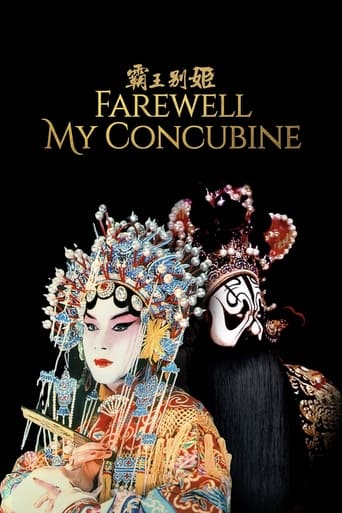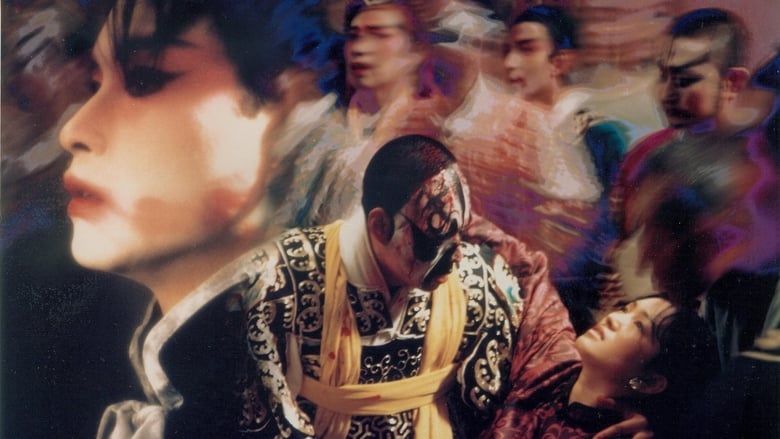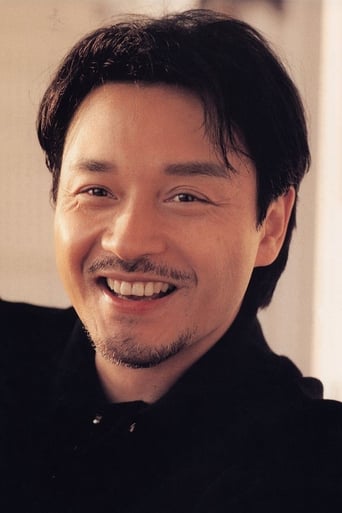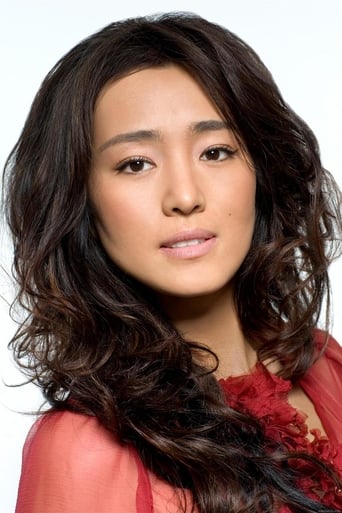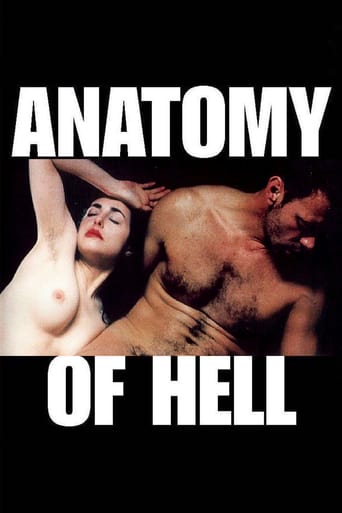Farewell My Concubine (1993)
Abandoned by his prostitute mother in 1920, Douzi was raised by a theater troupe. There he meets Shitou and over the following years the two develop an act entitled "Farewell My Concubine" that brings them fame and fortune. When Shitou marries Juxian, Douzi becomes jealous, the beginnings of the acting duo's explosive breakup and tragic fall take root.
Watch Trailer
Cast
Similar titles

Reviews
Slow pace in the most part of the movie.
Very interesting film. Was caught on the premise when seeing the trailer but unsure as to what the outcome would be for the showing. As it turns out, it was a very good film.
When a movie has you begging for it to end not even half way through it's pure crap. We've all seen this movie and this characters millions of times, nothing new in it. Don't waste your time.
There are moments that feel comical, some horrific, and some downright inspiring but the tonal shifts hardly matter as the end results come to a film that's perfect for this time.
The changing political fortunes of Beijing, China and it's opera is examined in this ambitious dramatic piece, focusing on a pair of theatrical stage brothers and a woman who comes between them. Realizing that a good portion of modern day China's history has been spent under Communist rule, it's nevertheless distressing to witness the type of torture aspiring actors had to go through in order to perfect their craft. The scenes of beatings and personal insults, especially when the principal characters were very young, seem altogether too brutal in the effort to make them remember their lines and deliver them effectively. It would seem more of a detriment to me to have that kind of pressure inflicted on someone. Perhaps the most distressing aspect of the story has to do with Xiaolou (Fengyi Zhang) and Cheng (Leslie Cheung) declared traitors and enemies against the People during the 1966 Cultural Revolution, when all they were doing was what they had always done, performing their roles to the applause of an appreciative audience. It only goes to prove that one's fortunes are largely dependent on those in power governing in their own self interest.
I had an enormous expectation at moment I seat on my couch and put the movie in my TV, and for my pleasure, the film doesn't disappointed me. I want to speak about four element who, in my opinion, make this film a truly masterpiece. 1. The beautiful photography and the perfect control of the time and the sequence of scenes for part of the director. Nothing is left, nothing is missing. The almost 3 hours what does this last, I almost didn't felt them. 2. The script work. Beautiful dialogues, natural link between one scene and another, and a very credible story. In no one part I thought "this is not possible". A very important achievement for a very ambitious movie like this. 3. The interpretations was magisterial, specially Leslie Cheung (Daoyi) and Gong Li (Juxian). All the time I felt I was looking the characters and I never saw the actor behind them. 4. The movie no only was about the opera, was a kind of opera. I'm a little familiar with the Chinese aesthetic, and this movie remember me the classic literature and the Beijing Opera progression. At the end the film become more symbolic and emotional, just like the climax of the classical Chinese works. This movie capture the Chinese soul, so we don't need to put names like "shakespearean" or make the reference of any other western artist, because the principal inspiration for this movie, in my point of view, is deeply Chinese. This movie is the Taoist ductility of the Chinese art, who are in constantly change and mutation.Anyone who loves the cinema, the history or the high art must see this movie.
In this movie based on Lilian Lee's masterpiece, Chen Kaige has mainly developed the evolution of the 'sentimental' link between two actors (one gay one) through the turbulent history of China in the 20th century, with the fall of the Empire, the Japanese occupation, the civil war, the communist victory and the Cultural Revolution. The Chinese opera "Farewell My Concubine" functions marvelously as a leitmotiv. The sentimental relationship between the two actors, and later with the lover of one of them played superbly by Gong Li, will be seriously shaken during the political earthquakes. Although 'everyone should be responsible for his own fate', everybody, if he isn't strong enough physically or psychologically, could be forced to betray his friend by false accusations, particularly during violent public interrogations. The political message of the film can be summarized by the slogan: 'Cursed are the tyrants who plunge their people into misery.'With unforgettable scenes, like the abandonment of a child by his mother, the rigorous training of the young aspirant-actors, the public political trials or the meeting of 'old friends', Chen Kaige translated perfectly in moving pictures (with sublime color grading) Lilian Lee's text.Nevertheless, Lilian Lee's book transcends all personal relationships with her sublime meditations on art, the artist, individual life, love, death and politics. One example from the book: in the ordinary world, victory and defeat, life or death are only during the time of a wink. But art and artists are not part of this world, where politics with its slogan 'kill or be killed' only sow pain, suffering and misery. Through art, the spectators escape during the spectacle for a few hours the harsh reality of life and enter into a world of dreams and deepest emotions, which are embodied in the actors (of Chinese operas). This movie is a must see for all lovers of world cinema.
Farewell My Concubine is a glorious epic about two friends over the span of many decades. Together they go through the horrors of opera school as children in the 1920's, and then Opera stars during the Japanese invasion of China in the 30's, the Communist takeover in the 40's, and the Cultural Revolution of the 60's. Between them is the wife of one and a former prostitute, Juxian, played by Gong Li. The relationship among the three is often very complex, and goes through plenty of turmoil, but Dieyi and Xiaolou and the Beijing Opera somehow stay together.This movie to put it simply is beautiful, particularly during the opera scenes. It's one of the most pleasing movies just to look at that I have seen in some time. It's also beautifully told. With so much ambition it could have been way too complex for someone not familiar with the history to understand, but it's actually quite direct and flows fantastically from one section to another.The two acting leads do good jobs, but it's Gong Li that stands out. Her character evolves greatly at first from dislike of Dieyi to sympathy and even tenderness. In her marriage to Xialou she wants him to quit Opera, but eventually accepts it and sees it as a necessary part of his life. Gong Li is the main heart and soul of the film, and this is the best acting work I have seen from her.This certainly stands as one of the five best Chinese language films I have ever seen. It's not completely flawless, some of the earlier scenes I think are a bit heavy-handed, but overall this epic and tragic story for friendship and love is a must see.
